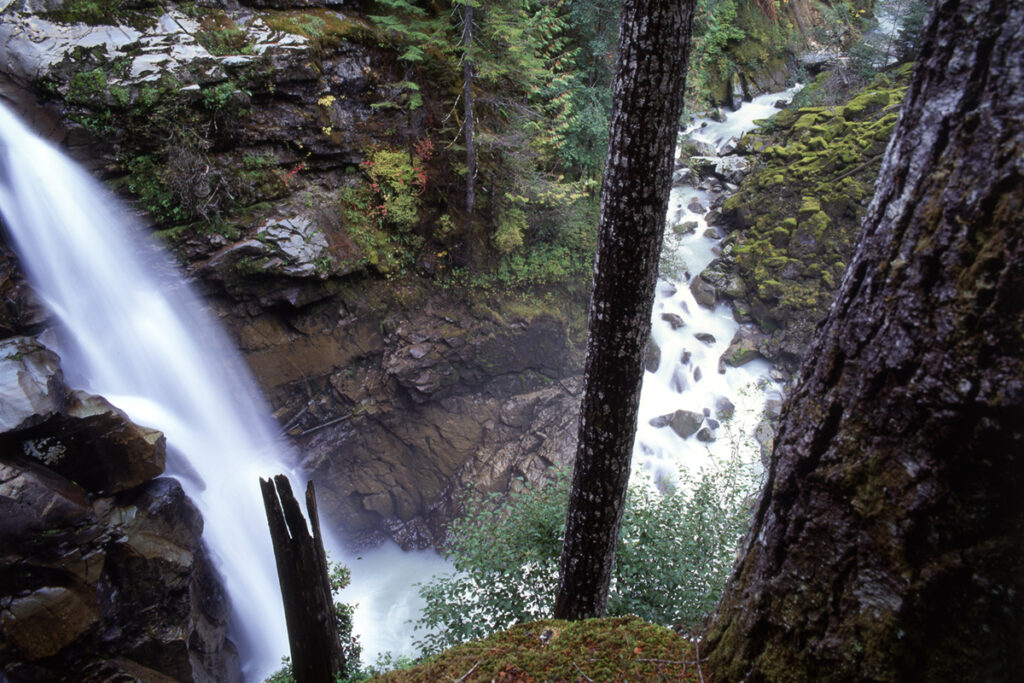30 Sep Do Waterfalls Make People Feel Good?
EarthTalk®
From the Editors of E – The Environmental Magazine
Dear EarthTalk: Is it true that being around a waterfall makes you feel good? – S.B., Lewiston, ME
The notion of waterfalls making you happy is often viewed as an “old wives’ tale,” but there may be some truth to it given the so-called “negative ions” pervasive in such environments. The collision of water molecules with each other causes water to be positively charged and surrounding air to be negatively charged. According to Pierce Howard, Ph.D., author of The Owner’s Manual for the Brain: Everyday Applications from Mind-Brain Research, it makes sense that waterfalls can make you feel good, given that negative ions hitting our bloodstream can produce biochemical reactions linked to alleviating depression, relieving stress and boosting energy.

Nooksack Falls, Mt. Baker-Snoqualmie National Forest, Washington, US
“High concentrations of negative ions are essential for high energy and positive mood,” he reports. “Negative ions suppress serotonin levels in much the same way that natural sunlight suppresses melatonin. Hence the invigorating effect of fresh air and sunshine and the correspondingly depressed feelings associated with being closed in and dark.”
“The atmosphere we breathe normally is full of positive and negative ions,” he adds. “Air-conditioning, lack of ventilation, and long dry spells remove negative ions…the best ratios of negative to positive ions are associated with waterfalls and the time before, during and after storms,” says Howard. “The worst are found in windowless rooms and closed, moving vehicles.”
Our love of waterfalls only underscores that people thrive when they are exposed to nature on a regular basis. A 2013 study in the journal Environmental Science & Technology definitively linked exposure to nature directly with improved mental health, comparing the mental health of those who moved from city landscapes to greener, more natural settings with those who relocated in the reverse direction. Researchers found that those who relocated to settings with a higher exposure to nature were noticeably happier during the three-year study period. “Environmental policies to increase urban green space may have sustainable public health benefits,” they concluded.
In another recent study, researchers sampled the effects of nature on 537 University of Rochester students in both real and imagined situations, and found that individuals who spent time outdoors—or even just imagined themselves in nature—consistently experienced higher energy levels and increased feelings of happiness. Study participants who spent just 20 minutes outdoors a day experienced significant increases in energy levels as well as noticeable mood boosts. Even indoor plants played a role in helping study participants feel more energized.
Another way to look at it would be to consider our sedentary, indoor lifestyle as a drain on our energy reserves and taxing to our mood and general sense of well-being. In the landmark 2005 book Last Child in the Woods, Richard Louv coined the term “nature deficit disorder” to explain how our lack of time outdoors has led to behavioral problems in kids and adults alike. Louv’s prescription? Spend more time outdoors (away from screens) interacting with nature and each other.
In case you needed another reason to get off the couch and out into the woods on a waterfall hike, now you have it. You’ll be sharper. You’ll be more productive. You’ll be invigorated. And you’ll be happier.
CONTACTS: The Owner’s Manual for the Brain, amzn.to/3gAlLTm; Last Child in the Woods, amzn.to/3kcRb4b; “Green spaces deliver lasting mental health benefits,” medicalxpress.com/news/2014-01-green-spaces-mental-health-benefits.html.
EarthTalk® is produced by Roddy Scheer & Doug Moss for the 501(c)3 nonprofit EarthTalk. See more at https://emagazine.com. To donate, visit https://earthtalk.org. Send questions to: question@earthtalk.org.




Sorry, the comment form is closed at this time.